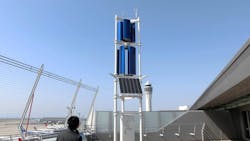Kanoa Winds and HCDA Installing and Testing Japanese Compact Vertical Wind Turbine Technology in Hawaii
The Hawaii Community Development Authority (HCDA) has partnered with Kanoa Winds to bring Japanese clean energy technology to Kakaako Makai and study its feasibility in the islands by operating a wind turbine for research and demonstration purposes.
The turbine technology - known as the Vertical Coaxial Contra-Rotating Twin Blades (VCCT) wind turbine - has been used throughout Japan for more than 15 years near transportation hubs, attached to industrial facilities, and in residential mixed-use communities.
“These compact vertical turbines are successfully used in densely populated areas throughout Japan,” said HCDA Executive Director Craig Nakamoto. “We are very excited to be collaborating with Kanoa Winds to test this technology’s small but mighty ability to harness the power of wind for a new alternative to Hawai‘i’s clean energy future.”
According to the partners, the VCCT is able to generate power at a significantly wider range of wind speeds than traditional horizontal-axis wind turbines, such as those currently in operation in Kahuku on the North Shore of O'ahu. Specifically, the VCCT can operate at wind speeds between 7 and 134 mph, whereas traditional horizontal-axis wind turbines typically stop generating power at wind speeds of about 44 mph.
For this project, Kanoa Winds will install a 0.5 kW VCCT unit near the Hawaii Technology Development Corporation Entrepreneur Sandbox to conduct an in-depth study of its wind speed power generation, equipment load, stability tests, safety evaluation, wildlife impact, and environmental assessment. The unit is shorter than a typical street light and will be erected within a footprint of about 24 sq ft.
“The VCCT wind turbines in Japan have been known to have birds nesting within the device, proving the safety and coexistence between the birds and the VCCT technology,” explained Kanoa Winds Founder and CEO Kaname Takeya. “The Japan Falconiformes Center has endorsed the technology due to its safety and reliability while having minimal impact on the environment.”
